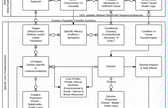

IHS Goldfire. TRIZ. TRIZ (/ˈtriːz/; Russian: теория решения изобретательских задач, teoriya resheniya izobretatelskikh zadatch) is "a problem-solving, analysis and forecasting tool derived from the study of patterns of invention in the global patent literature".[1] It was developed by the Soviet inventor and science fiction author Genrich Altshuller and his colleagues, beginning in 1946. In English the name is typically rendered as "the theory of inventive problem solving",[2][3] and occasionally goes by the English acronym TIPS.
Following Altshuller's insight, the theory developed on a foundation of extensive research covering hundreds of thousands of inventions across many different fields to produce a theory which defines generalisable patterns in the nature of inventive solutions and the distinguishing characteristics of the problems that these inventions have overcome. There are three primary findings of this research. History[edit] Basic principles of TRIZ[edit] TRIZ process for creative problem solving. Thinkers & Institutions Focused On Problem-Solution Models. Trello.com Product Roadmap. ConceptNet 5. Alvin Toffler. Judea Pearl. Judea Pearl (born 1936) is an Israeli-born American computer scientist and philosopher, best known for championing the probabilistic approach to artificial intelligence and the development of Bayesian networks (see the article on belief propagation). He is also credited for developing a theory of causal and counterfactual inference based on structural models (see article on causality).
He is the 2011 winner of the ACM Turing Award, the highest distinction in computer science, "for fundamental contributions to artificial intelligence through the development of a calculus for probabilistic and causal reasoning".[1][2][3][4] Judea Pearl is the father of journalist Daniel Pearl, who was kidnapped and murdered by militants in Pakistan connected with Al-Qaeda and the International Islamic Front in 2002 for his American and Jewish heritage.[5][6] Biography[edit] Pearl is currently a professor of computer science and statistics and director of the Cognitive Systems Laboratory at UCLA.
Books[edit] Ken Wilber. Kenneth Earl "Ken" Wilber II (born January 31, 1949, in Oklahoma City, Oklahoma) is an American writer and public speaker. He has written and lectured about mysticism, philosophy, ecology, and developmental psychology. His work formulates what he calls Integral Theory.[1] In 1998 he founded the Integral Institute.[2] Biography[edit] Wilber was born in 1949 in Oklahoma City. In 1967 he enrolled as a pre-med student at Duke University.[3] He became inspired, like many of his generation, by Eastern literature, particularly the Tao Te Ching. He left Duke and enrolled in the University of Nebraska at Lincoln, completing a bachelor's degree in chemistry and biology and a master's degree in biochemistry.[4][unreliable source?]
In 1973 Wilber completed his first book, The Spectrum of Consciousness,[5] in which he sought to integrate knowledge from disparate fields. In 1983 Wilber married Terry "Treya" Killam who was shortly thereafter diagnosed with breast cancer. Theory[edit] Holons[edit] Ray Kurzweil. Ken Wilber.